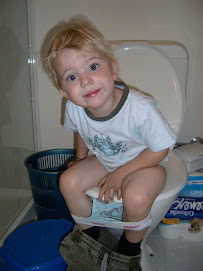I dont need this now!I'm a big boy/girl
http://howtogetbabysleepingthrothenight.blogspot.com/.
Now the next challenge, that will again, like good sleeping make a major convenience change in your life,not to mention the great reduction in costs, is potty training; known to some people as toilet trainng!
Baby's potty training is one of those milestones in your child's life - it can be an incredible bonding experience between the child and his / her parents. It's also an important step in the development of the child because for the first time in the baby's life, he / she will have a feeling of independence and responsibility. Once potty trained, your baby will be responsible for taking themselves to the potty to do their business.
The Right Baby Potty Training Age
Decades ago in the 1960's, 80% of all babies were potty trained by the age of 18 months. Today, the average is closer to 36 months (3 years) - in other words it has almost doubled in a shade under fifty years. The technology of the modern diaper is largely to blame because they are now so absorbent that the baby can hardly feel any discomfort when an accident occurs and therefore has no reason to want to get out of diapers. Back in the old days of the cotton diapers, it wasn't comfortable and you'd soon know as a parent if the baby needed changing!
It's important for parents to realise that potty training is a huge step in the development of a child and to delay potty training to three or four years into the child's life may hamper the baby's development. Generally speaking the baby is ready for potty training by the age of 18 months. This means that he / she is physically up to the task, can communicate, can follow simple instructions and is having regular soft formed bowel movements.
Apart from these crucial signs, there are other signs that will give you an idea of how ready the baby is to be potty trained. I call these "nice to have" because they aren't fundamental but if present it means your job of training the child will probably be a bit easier.
Nice to Have Baby Potty training Signs
I've already mentioned that the baby must be physically able to pull up / down pants, communicate, follow simple instructions and have regular soft formed bowel movements but you should also look out for these nice to have signs as well:
- Does the baby imitate any actions that you or a partner does?
- Is the baby showing signs of wanting some independence?
- Does the baby show any signs of understanding when he / she needs the toilet?
- Does the baby show signs of discomfort after an accident?
If you answered yes to any of those points then that's a very good sign!
How long does it take to complete the baby potty training?
The amount of time it takes to potty train a baby varies greatly. Some children just simply learn faster than others. The average training time is somewhere between a couple of days and a couple of months.
There is hardly any difference between boys and girls when it comes to potty training although studies have shown that girls are generally slightly more receptive to their potty training and learn slightly faster. However, girls are also at more of a risk to infection so make sure you look out for painful frequent urination or abdominal pain. If you see any of those signals then take her straight to the doctor for a professional medical opinion.
High level overview of the Baby potty training process
When you have established that your child is ready for potty training the first port of call is to buy the necessary equipment. You have the option of child sized potties or even a special child-sized seat for the toilet. It's also possible to pick up some kind of picture book or DVD to capture the child's interest. One famous toy that seems to be popular amongst the kids at the moment (although not amongst the parents because of its high pitched annoying tone) is potty Elmo - based on the character from Sesame Street. These training aids can help captures the child's interest but shouldn't be relied on too heavily.
Next it's all about introducing some kind of routine to the baby. So it's advisable to take him / her to the toilet or potty to get the baby used to it and to make sure that the baby isn't scared or intimidated. This should happen over a period of a day or two - just keep making regular trips to the bathroom until the baby is comfortable with the surroundings. Explain the purpose of the toilet and what people use it for.
The next step is to ditch the nappy and explain how and why adults undress before going to the toilet / potty. Physically show the baby where the excrement should go by taking the nappy over to the potty and putting it in. Next you'd explain that the baby is responsible for going to the toilet and make sure that the baby understands that he / she can go to the toilet whenever is required. This is the first time the baby has ever had independence and responsibility and is a defining moment a child's development.
Finally, when all else is sorted, you can resort to night training. Be warned that it can take another couple of years for the babies to master the art of understanding when they need to go to the toilet whilst asleep. Accidents will happen but handle them gracefully and definitely don't punish the child.
A Tip To Speed Up your Potty Training
It is very important to understand child psychology when potty training so that you can develop a desire in the baby to be potty trained. When you can establish this desire, the potty training process can be achieved in a lot less time than average. In fact, most parents feedback that they managed to get their child trained in a couple of days using these child psychology techniques. Whilst a full explanation of these techniques is out of scope for this article you can read up more about them in a guide called HEART Potty Training.
Article Source: http://EzineArticles.com/?expert=Selin_Aydoshan
The change in your lives on successfuly completing potty traing is a major step from having a baby/toddler in your family to having a little person.This little person does not neeed the expense, bulk or disposal difficulties of diaper luggage on family trips.
If you came to this blog in search of information on later stages of baby's developoment why not go to http://babywalking-admin.blogspot.com/ where advice on baby's progress is offered and possibly http://whenyourchildspeaks.blogspot.com/ and even further to http://teachyourchildtoread-admin.blogspot.com/ when you will have a real "walking, talking, writing little person in your family. Enjoy the wonder of parenthood!


